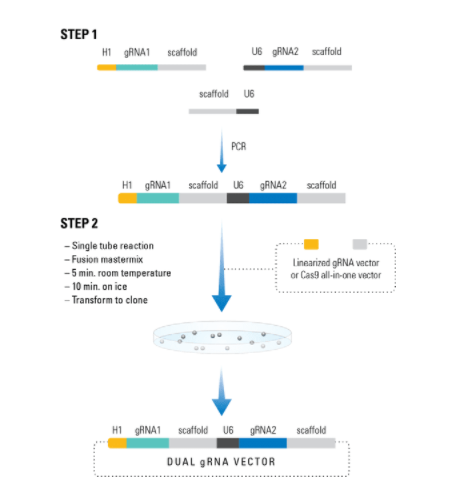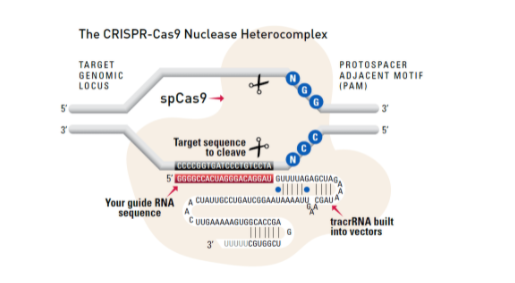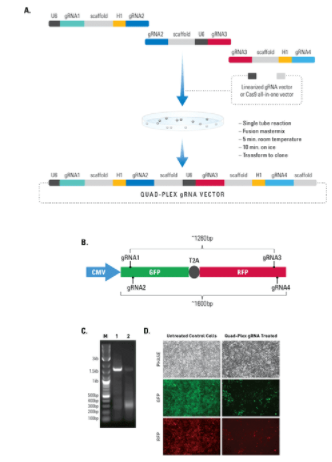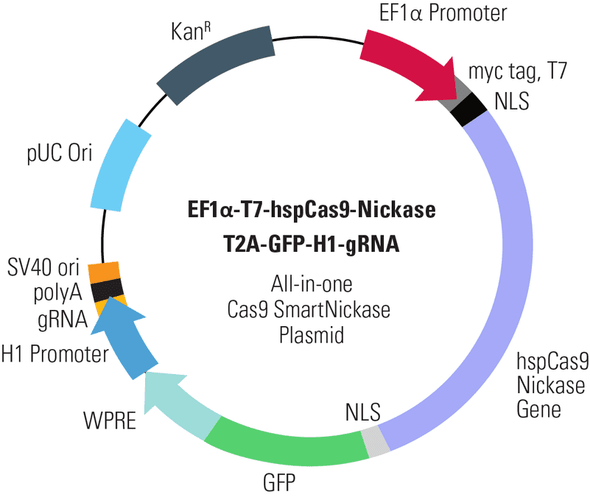System Biosciences
Cas9 Nickase: CAG-T7-hspCas9-nickase-T2A-RFP-H1-gRNA linearized SmartNickase vector
- SKU:
- CAS771R-1
- Availability:
- Usually Shipped in 5 Working Days
- Size:
- 10 rxn
- Shipping Temperature:
- Blue Ice
Description
Cas9 Nickase: CAG-T7-hspCas9-nickase-T2A-RFP-H1-gRNA linearized SmartNickase vector. Cat# CAS771R. Supplier: SBI System Biosciences
- Conveniently deliver Cas9 SmartNickase and gRNA with a single vector
- Reduce off-target activity with Cas9 SmartNickase
- Monitor transfection efficiencies with RFP, which is coordinately expressed with the hspCas9 gene via the T2A element
- Drive Cas9 expression with the CAG promoter, which provides high expression levels in primary cells and stem cells
- Express gRNA from the H1 promoter for maximum specificity and choice of targets
Products

Overview

- Conveniently deliver Cas9 and gRNA with a single vector
- Reduce off-target activity
- Drive Cas9 expression with the CAG promoter, which provides high expression levels in primary cells and stem cells
- Express gRNA from the H1 promoter for maximum specificity and choice of targets
- Ensure efficient import of Cas9 to the nucleus with N-term and C-term nuclear localization signals (NLSs)
- Boost Cas9 gene expression and stabilize the transcript via the WPRE regulatory element after the C-term NLS
- Easily detect and/or purify the Cas9 protein with the N-term myc-tag
- Produce Cas9 mRNA via in vitro transcription using the T7 promoter
- Edit multiple loci at once, save time and reagents
- Easily generate multi-cistronic gRNA expression constructs
- Ideal for Cas9 Nickase applications
- Great for studying signaling pathways

How It Works
Using SBI’s All-in-one Cas9 SmartNickase Plasmids with a Mulitplex gRNA Cloning Kit
The workflow at-a-glance

Figure 1. The Multiplex gRNA Cloning Kit workflow.
1.Use the Multiplex gRNA Cloning Kit to prepare your multiplexed gRNA insert (Figure 1)
The PrecisionX Multiplex gRNA Cloning Kit provides H1 and U6 promoter blocks to easily build multiple gRNA cassettes (Figure 1). In Step 1, primers with overlapping ends containing the desired gRNA (designed by user) and the scaffold-promoter block (from the kit) are combined in a PCR reaction to generate a PCR amplicon containing both gRNAs. In Step 2, the PCR amplicon is combined with the fusion reaction mix along with the linearized expression vector for seamless construction.
- Transform into competent cells and grow in LB/Kanamycin plate (50 µg/ml)
- Confirm positive clones by direct sequencing
- Transfect sequence-verified All-in-one construct into mammalian cells using standard transfection protocols (co-transfect with an HR Targeting Vector, if required for your application)
- Perform a Surveyor Nuclease assay (or other suitable mismatch cleavage assays) to check for site-specific genome cleavage and select for desired clones
Genome engineering with CRISPR/Cas9
For general guidance on using CRISPR/Cas9 technology for genome engineering, take a look at our CRISPR/Cas9 tutorials as well as the following application notes:
CRISPR/Cas9 Basics
Through careful selection of the target sequence and design of a donor plasmid for homologous
recombination, you can achieve efficient and highly targeted genomic modification with CRISPR/Cas9.
The system

Cas9 protein—uses guide RNA (gRNA) to direct site-specific, double-strand DNA cleavage adjacent to a protospacer adapter motif (PAM) in the target DNA.
gRNA—RNA sequence that guides Cas9 to cleave a homologous region in the target genome. Efficient cleavage only where the gRNA homology is adjacent to a PAM.
PAM—protospacer adapter motif, NGG, is a target DNA sequence that spCas9 will cut upstream from if directed to by the gRNA.
The workflow at-a-glance
DESIGN: Select gRNA and HR donor plasmids. Choice of gRNA site and design of donor
plasmid determines whether the homologous recombination event results in a knock-out,
knock-in, edit, or tagging.
CONSTRUCT: Clone gRNA into all-in-one Cas9 vector. Clone 5’ and 3’ homology arms into HR
donor plasmid. If creating a knock-in, clone desired gene into HR donor.
CO-TRANSFECT or CO-INJECT: Introduce Cas9, gRNA, and HR Donors into the target cells
using co-transfection for plasmids, co-transduction for lentivirus, or co-injection for mRNAs.
SELECT/SCREEN: Select or screen for mutants and verify.
VALIDATE: Genotype or sequence putative mutants to verify single or biallelic conversion.
Supporting Data
Simultaneous editing at multiple genomic locations

Figure 2. The Multiplex gRNA Cloning Kit enables efficient delivery of four gRNAs.
(A) We used a quad-plex gRNA created using the Multilplex gRNA Cloning Kit and an All-in-one Cas9 SmartNickase Vector to remove a
(B) 1260 bp GFP-T2A-RFP segment from a cell line with a stably integrated CMV-GFP-T2A-RFP expression cassette. We cloned the four gRNAs into a Cas9 SmartNickase vector (EF1Nickase-H1-gRNA) to guide two double nicking events—one at the 5’ end of the GFP and the other at the 3’ end of the RFP gene.
(C) PCR assays with primers just outside of the GFP and RFP genes generate a 1600 bp fragment in the absence of the SmartNickase vector (lane 1), and a 340 bp fragment in the presence of the Cas9 SmartNickase-4 gRNA construct (lane 2), demonstrating the efficiency of SmartNickase-mediated paired double-nicking and GFP-T2A-RFP genomic deletion.
(D) Deletion of both GFP and RFP activities can also be seen in a functional assay, through reduction in both GFP and RFP fluorescence.















